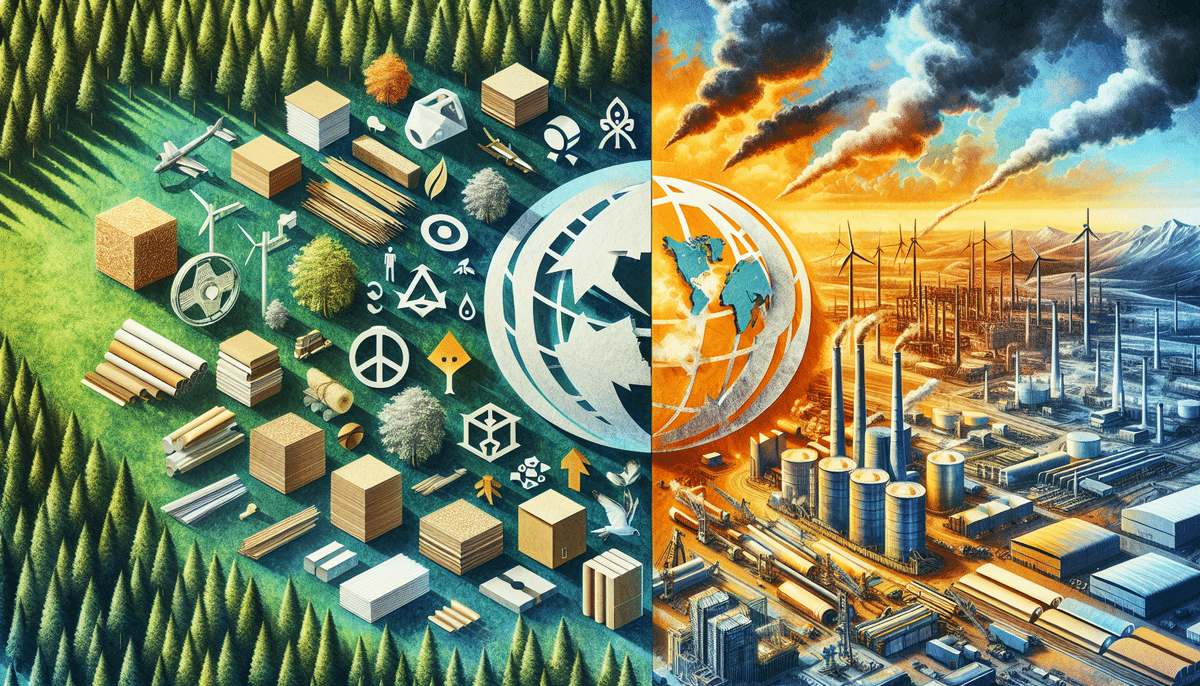The History of Georgia-Pacific and International Paper
Georgia-Pacific was founded in 1927 in Augusta, Georgia, initially as a small lumber company. Over the decades, the company expanded its operations into building products, paper, and packaging, becoming one of the largest privately held companies in the United States. In 2005, Koch Industries acquired Georgia-Pacific, and it now operates as a subsidiary, continuing to influence the paper and packaging industry significantly.
International Paper, established in 1898 in New York City, has a long-standing history in the paper and packaging sector. Through numerous acquisitions and mergers, International Paper has grown into one of the world's largest paper and packaging companies, maintaining a robust global presence.
Sustainability Initiatives of Georgia-Pacific and International Paper
Both Georgia-Pacific and International Paper have prioritized sustainability, recognizing the environmental impact of their operations.
Georgia-Pacific's Sustainability Efforts
- Investments in sustainable forestry practices, including certifications from the Forest Stewardship Council and the Sustainable Forestry Initiative.
- Implementation of energy-efficient technologies in manufacturing to reduce carbon footprint.
- Commitment to reducing greenhouse gas emissions and conserving water resources.
International Paper's Sustainability Goals
- Goal to reduce greenhouse gas emissions by 20% by 2020, with ongoing efforts to further decrease emissions.
- Investment in renewable energy sources, such as biomass and wind power.
- Implementation of water conservation measures across manufacturing facilities.
For more detailed information, refer to International Paper's Sustainability Report.
Key Differences Between Georgia-Pacific and International Paper
While both companies are titans in the paper and packaging industry, several key differences distinguish them:
Ownership and Market Presence
- Georgia-Pacific: Privately held by Koch Industries with operations primarily in the United States.
- International Paper: Publicly traded on the New York Stock Exchange with a presence in over 24 countries.
Product Offerings
- Georgia-Pacific: Diverse range including paper towels, tissues, napkins, plywood, and lumber.
- International Paper: Focused mainly on paper and packaging products like cardboard boxes and printing paper.
Revenue and Employment
- Georgia-Pacific: Operates over 200 facilities in the U.S. with approximately 30,000 employees and estimated annual revenue of $19.98 billion in 2020.
- International Paper: Over 100 facilities worldwide, employs around 50,000 people, and reported revenues exceeding $22 billion in 2020.
Industries Served by Georgia-Pacific and International Paper
Both companies cater to various industries, though they have distinct areas of focus:
Packaging and Containerboard
International Paper has a strong emphasis on corrugated packaging, serving industries that require robust packaging solutions for transportation and storage.
Building Products
Georgia-Pacific has a significant presence in the building products industry, producing plywood, gypsum board, and other essential construction materials.
Recycling Initiatives
Both companies operate recycling facilities and engage in responsible forest management practices. Georgia-Pacific collects and processes materials like cardboard and paper across the U.S., while International Paper partners with organizations to promote sustainable recycling and reduce waste.
Financial Performance of Georgia-Pacific and International Paper
Both organizations demonstrate strong financial standings, though International Paper, being publicly traded, provides more transparent financial data:
International Paper
- Reported a net income of $1.2 billion in 2020, down from $1.7 billion in 2019.
- Continues to generate over $22 billion in annual revenue.
- Adapted to market fluctuations caused by the COVID-19 pandemic by adjusting production levels.
Georgia-Pacific
- Estimated annual revenue of approximately $19.98 billion in 2020.
- Experienced increased demand for consumer products like toilet paper and paper towels during the pandemic.
- Faced challenges related to supply chain disruptions and rising raw material costs.
For the latest financial data, visit International Paper's Financial Reports.
The Impact of COVID-19 on Georgia-Pacific and International Paper
The COVID-19 pandemic significantly affected the paper and packaging industry, influencing both Georgia-Pacific and International Paper in various ways:
Supply Chain Disruptions
Both companies faced challenges due to disruptions in global supply chains, leading to increased costs and logistical hurdles.
Shift in Product Demand
- Georgia-Pacific: Saw a surge in demand for hygiene products such as toilet paper and paper towels.
- International Paper: Experienced decreased demand for office-related paper products as businesses transitioned to remote work.
Sustainability Focus
The pandemic underscored the importance of sustainable practices, prompting both companies to enhance their commitments to eco-friendly operations and materials.
SWOT Analysis of Georgia-Pacific and International Paper
Strengths
- Extensive product portfolios and well-established brands for both companies.
- Global presence enhances International Paper's market reach.
- Georgia-Pacific's diversified offerings, especially in building products.
Weaknesses
- International Paper has faced financial fluctuations and challenges.
- Georgia-Pacific's status as a private company limits public financial transparency.
Opportunities
- Expansion into emerging markets and investment in innovative technologies.
- Increasing demand for sustainable and eco-friendly products.
Threats
- Rising competition in the paper and packaging sector.
- Changing consumer preferences towards digital communication reducing paper demand.
Sustainability Efforts of Georgia-Pacific and International Paper
Both Georgia-Pacific and International Paper have made substantial commitments to sustainability:
Georgia-Pacific
- Reduction of greenhouse gas emissions through energy-efficient manufacturing processes.
- Conservation of water resources across all facilities.
- Sourcing wood from certified sustainable forests, ensuring responsible forestry practices.
International Paper
- Commitment to decreasing greenhouse gas emissions and enhancing energy efficiency.
- Improvement of supply chain sustainability through partnerships and certifications.
- Investment in renewable energy projects to power manufacturing facilities.
Both companies have been recognized with various sustainability awards, reflecting their dedication to environmental stewardship.
The Future Outlook for Georgia-Pacific and International Paper
The future for both Georgia-Pacific and International Paper looks promising, with strategies in place to navigate evolving market dynamics:
Technological Innovation
Continued investment in advanced technologies will drive efficiency and sustainability in operations.
Market Adaptation
Both companies are adapting to changing consumer demands by expanding product lines and exploring new markets.
Sustainability Leadership
Ongoing commitment to eco-friendly practices will position both companies as leaders in sustainability within the industry.
For insights into future plans, refer to Georgia-Pacific's Strategic Initiatives and International Paper's Future Sustainability Goals.
A Comparative Analysis of Products Offered by Georgia-Pacific and International Paper
Analyzing the product offerings reveals distinct focuses for both companies:
Georgia-Pacific
- Consumer products such as paper towels, tissues, and napkins.
- Building materials including plywood, lumber, and gypsum board.
- Specialty packaging solutions tailored for various industries.
International Paper
- Corrugated packaging products like cardboard boxes.
- Printing paper for commercial and industrial use.
- Recycling and renewable packaging solutions to meet sustainability demands.
While Georgia-Pacific maintains a diverse product range encompassing both consumer and building products, International Paper concentrates primarily on paper and packaging, leveraging its global infrastructure to deliver large-scale solutions.
The Corporate Culture of Georgia-Pacific vs International Paper
Cultural dynamics play a significant role in shaping each company's operational approach:
Georgia-Pacific
- Emphasizes employee satisfaction and customer-centric strategies.
- Fosters a collaborative and inclusive work environment.
- Values innovation and continuous improvement in product development.
International Paper
- Adopts a data-driven approach to decision-making and strategy formulation.
- Focuses on operational efficiency and scalability.
- Promotes a culture of sustainability and corporate responsibility.
Adapting to New Technologies: Georgia-Pacific and International Paper
Embracing technological advancements is crucial for maintaining competitiveness and sustainability:
Georgia-Pacific's Technological Investments
- Introduction of new tissue machines that utilize less water and energy.
- Adoption of automation and digital technologies to streamline manufacturing processes.
- Investment in research and development for innovative product solutions.
International Paper's Technological Innovations
- Development of advanced corrugated packaging that minimizes waste.
- Implementation of smart manufacturing technologies for enhanced efficiency.
- Use of data analytics to optimize supply chain and operational performance.
Both companies are committed to leveraging technology to enhance sustainability and meet evolving market demands effectively.
Key Milestones in the History of Georgia-Pacific and International Paper
Significant milestones have shaped the trajectories of both Georgia-Pacific and International Paper:
Georgia-Pacific
- 1927: Founded in Augusta, Georgia.
- 2005: Acquired by Koch Industries, expanding its operational capabilities.
- 2010s: Expanded product lines to include a broader range of building materials.
International Paper
- 1898: Established in New York City.
- 2000: Acquired Champion International, significantly increasing market share.
- 2010s-2020s: Focused on global expansion and sustainability initiatives.
These milestones have been pivotal in establishing both companies as leaders in the paper and packaging industry.
Conclusion
Georgia-Pacific and International Paper stand as two of the most influential companies in the paper and packaging sector. While they share a commitment to sustainability and operate within the same industry, their distinct histories, product focuses, and corporate cultures set them apart. Georgia-Pacific's diverse product range and strong presence in the U.S. market complement International Paper's extensive global reach and specialized packaging solutions. Both companies are well-positioned to navigate future challenges and continue their legacy of innovation and sustainability in the evolving market landscape.






















